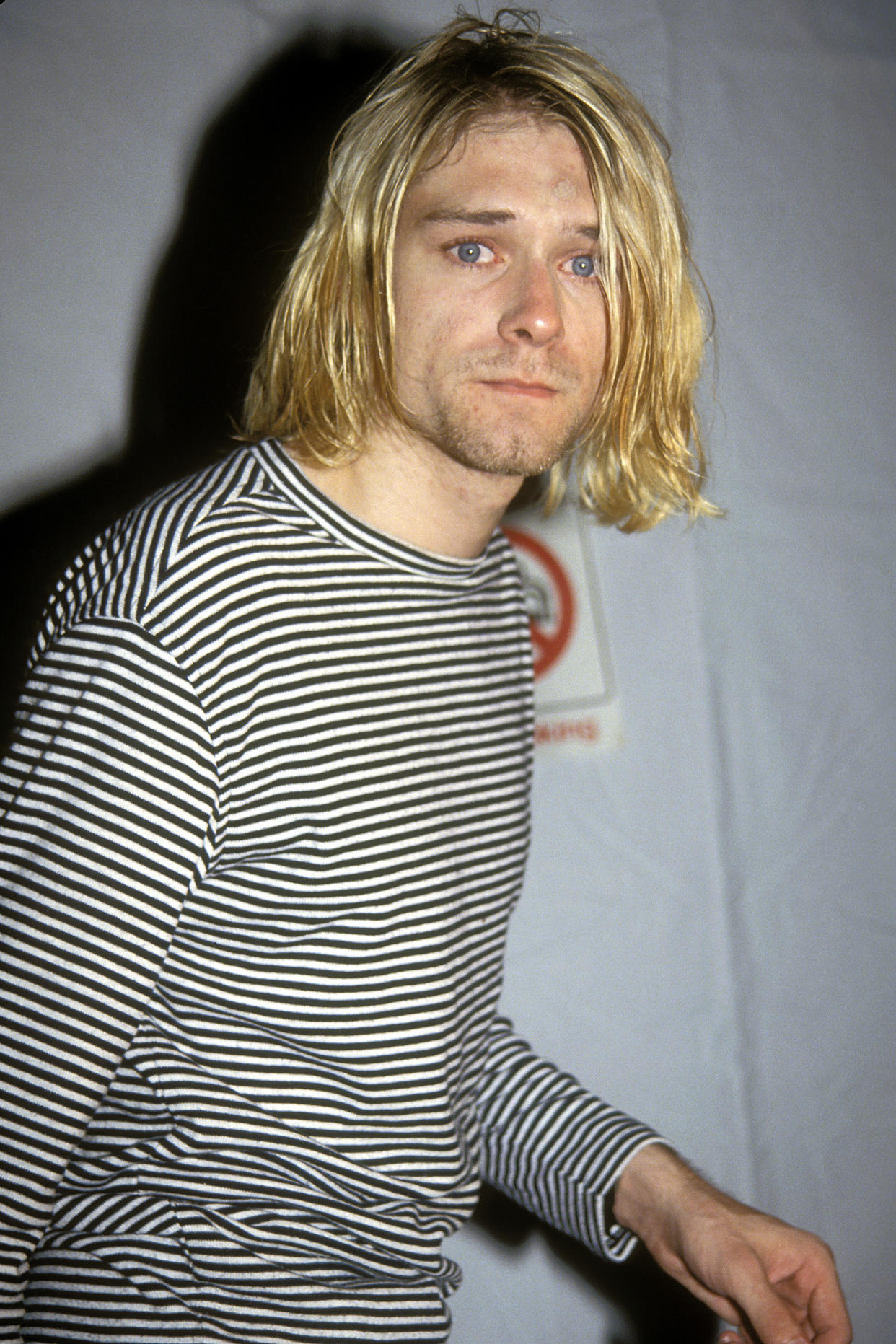The battle over the Kurt Cobain death-scene photos explained

It has been 24 years since Kurt Cobain‘s suicide, but the fascination with it — as well as the conspiracy theories around it — continues. On Tuesday, the Washington State Court of Appeals ruled that newly discovered photographs from the crime scene will not be made public, despite the continued efforts of a “conspiracy theorist” who doesn’t believe the singer’s death was a suicide. It’s a legal victory for Cobain’s widow, Courtney Love, and daughter, Frances Bean Cobain, who opposed the release and were horrified at the thought of stumbling upon the photos on the internet.
So … what photos are we talking about?
Approximately four years ago, as the 20th anniversary of the Nirvana frontman’s death approached, Detective Mike Ciesynski, who worked the case years earlier, pulled out the file and discovered four rolls of undeveloped film from inside the 27-year-old musician’s Seattle home taken the day his body was found in the greenhouse. The film was developed and 26 pictures, none of the star’s full body (though parts of it), were released in 2014. Many of the photos were duplicates of ones the Seattle Police Department had already released, including the placement of the suicide note (with a pen through it) in a flower pot, a cigar box holding the the grunge rocker’s apparent heroin stash, his driver’s license, his shotgun, and the like. Additionally, nine previously snapped Polaroids were released for the first time, depicting Cobain’s drug paraphernalia as well as exterior pictures of the Lake Washington house, the greenhouse, and the view of the home from the street. The new photos didn’t provide enough evidence to reopen the case, which was ruled an apparent suicide. The lawsuit was demanding the release of all the other photos that hadn’t been put out publicly, including photos of Cobain’s body.

Who wanted them released?
A journalist named Richard Lee, who is described in court documents as “a conspiracy theorist who believes that Mr. Cobain was murdered,” was the one to file the lawsuit against the city of Seattle and its police department in 2014. He has researched the death for years and even hosted a public access TV show called Now See It Person to Person: Kurt Cobain Was Murdered. He represented himself and said the photos of Cobain’s body should be made public under Washington State’s Public Records Act. A lower court decided that the photos were exempt from state open-record laws and releasing them would violate the privacy of Cobain’s widow and the couple’s daughter.
Who didn’t want them released?
That would be Courtney Love and Frances Bean Cobain. They both filed declarations in the case, with Love saying, “I have never seen these graphic and disturbing images, nor do I ever want to. Certainly, public disclosure would reopen all my old wounds and cause me and my family permanent — indeed, endless and needless — pain and suffering, and would be a gross violation of our privacy interests.” She talked about how the images would inevitably “wind up on the internet, where they would be permanently circulated. By virtue of the fact that Kurt is my late husband, they will also likely end up in search results about myself. I would unavoidably come across them, and I would never be able to erase those haunting images from my mind. I cannot even imagine the enormity of the trauma and mental scarring this would cause me, not to mention many others.” (The release of photos concerned Love as far back as 1995, when, according to police documents, she “called and asked if the photos could be destroyed to prevent any mistaken release.”)

Frances, who was a toddler when her father died, said that the release of the photos “would physically endanger me and my mother. I once saw mock photos depicting my father’s body. That experience irreparably scarred me. I cannot imagine how terrible it would be knowing that the photographs that Mr. Lee seeks were public and that I or any of my loved ones, including my father’s mother and sisters, might inadvertently see them. Release and publication of the photographs would shock me and exacerbate the posttraumatic stress that I have suffered since childhood.
“I have had to cope with many personal issues because of my father’s death,” Frances said. “Coping with even the possibility that those photographs could be made public is very difficult. Further sensationalizing it through the release of these pictures would cause us indescribable pain.”
Courtney Love recently remembered her husband on the 24th anniversary of his death:
the universe always rips open on this day… those ocean blue eyes, we miss you
A post shared by Courtney Love Cobain (@courtneylove) on Apr 5, 2018 at 10:23am PDT
The women had the support of Seattle city attorney Pete Holmes, who said that while he regularly advocates for opening records to the public, he felt death scenes are “out-of-bounds. … No one should worry whether they’ll happen upon photos of a family member’s body as they scroll through their social media feed.”
What the court ruling said
Lee was taken to task for a weak case; again he was representing himself, but the decision detailed the legal precedent that holds releasing death-scene images can violate the rights of family members. The judge also dismissed Lee’s requests to access a number of other confidential documents related to Cobain’s death. For instance, autopsies are confidential under state law.
Cobain was found dead on April 8, 1994, after disappearing from drug rehab. Love had said he was suicidal, and the autopsy ruled that he had died by a single gunshot wound to the head and that he had taken a huge amount of heroin. However, a private investigator, hired by Love when Cobain went missing, got the conspiracy theories started by claiming Cobain was murdered because he had so much heroin in his system he wouldn’t have been able to pull the trigger. Speculation grew from there — his death has its own Wikipedia page — and it has been a profitable business, with books and films examining some of the possibilities.
Read more from Yahoo Entertainment:
Smoking! Hilary Duff and neighbor’s feud escalates with cop calls and Disney fan ‘threats
The ‘Murphy Brown’ reboot is the anti-‘Roseanne,’ full of liberal laughs
Amy Schumer called the royal wedding a ‘dog show’; fans called her a ‘jealous pig’

